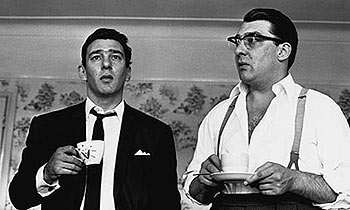Cockney Rhyming Slang Is À La Mode
Published on November 29th, 2009 in: Culture Shock, Issues, OMG British R Coming |
The last of the famous international playboys:
Reggie and Ronnie Kray
Let’s say you are a criminal. Perhaps you are only a xenophobic local? You could easily use the slang to ascertain if someone was familiar with your neighborhood. If asked, “What’s that in your Hampsteads?” you would need to be aware of the neighborhood of Hampstead Heath in order to know they were asking you, “What’s that stuck in your teeth?”
Hampstead Heath = Teeth = Hampsteads
In this way, you could get a fairly immediate and accurate basic read on someone based on their knowledge of the slang in general, and their own local usage of it. It could tell you where they were from, who they hung around with, who they were.
In this way outsiders could be quickly identified, and you could still speak privately directly in front of a cop (Ol’ Bill) or posh arsehole without fear of them having a clue as to what was just said. (This is reminiscent of my Korean-given mani/pedis!)
The example noted above brings us straight to yet another confusing part of rhyming slang. After straight slang, there is also the habit of dropping the actual rhyming word from the slang phrase. You have to get to Hampteads after dropping the Heath.
Another common example of this is found in the original slang for Head, “Loaf of Bread.” The common usage of this slang would be, “Use your loaf,” meaning, “Use your head.” Loaf will never rhyme with Head no matter how Elephant’s Trunk (drunk) ye get! This shows further how you have to be in the know to use and understand rhyming slang.
It was ideally set up so the phraseology could be varied in its construction for specific situations as well as neighborhoods. Of course, as often happens with street slang, certain terms began gaining popularity with the general public. Many of the common usage rhyming slang phrases date to the 1840s, and these specific terms mean the same thing whether you are a barrister or a bruiser, from London or an outlying suburb. Below are a few of the most universal rhyming slang phrases and meanings
Apples and Pears = Stairs
Chevy Chase = Face
Bird Lime = Time
Frog and Toad = Road
Weeping Willow = Pillow
Horse and Cart = Tart (casual girlfriend)
Trouble and Strife = Wife
Bull and Cow = Row (fight)
China Plate = Mate (friend)
Donkey’s Ears = Years
Ginger Beer = Queer
3 Responses to “Cockney Rhyming Slang Is À La Mode”
December 3rd, 2009 at 9:50 am
Enjoyable article, but it’s Hampstead Heath, without an S on the end, and I don’t think that even a casual girlfriend would appreciate being called a tart!
December 3rd, 2009 at 11:01 am
Uh oh, typo alert!
LLM
December 7th, 2009 at 11:12 am
I think you are correct in saying no girl likes to be called a tart, per se. Instead of ‘casual girlfriend’, and for better translation to the American masses, let’s call her a hood rat, booty call, or last gal left in the bar at close…
Margaret
Time limit is exhausted. Please reload the CAPTCHA.